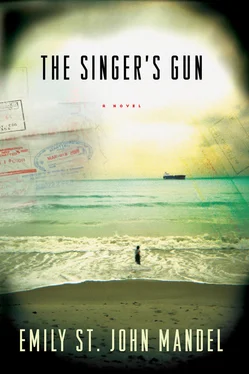Elena laughed softly and stood up from the floor. She put on her underwear and skirt, sat down again to button her shirt. When it was buttoned she stayed on the floor for a moment, combing her fingers through her hair in an effort to tame the disorder, and then began casting about for her shoes.
“It’s all right,” she said, “you don’t have to answer me if you don’t want to. It’s an enormous question.”
“No,” Anton said, “let me try to answer it, no one’s ever asked me that before. What was it like when I was growing up? It was wonderful, mostly. But I always wanted something else.”
“What did you want?”
“The same thing I want now,” he said. “A different kind of life.”
There were soldiers on the trains that night. He didn’t know what had made him open his eyes so suddenly, but he looked up just as the nineteen-year-old with the M16 met his eyes, and then they both looked away quickly. There were fifteen or twenty of them, standing quietly among the rush-hour crowd. They left the train at 59th Street, a flood of green camouflage between blue-painted pillars. What was stirring to him was the way they left all together without speaking, the way a flock of birds will sometimes rise all at once from a field.
Anton opened the door to his apartment on West 81st Street, his undershirt soaked through with sweat, and Sophie stood up from the sofa where she’d been reading and came to him. He was carrying a few shirts from the dry cleaners, and she took them from his hands before she kissed him.
“How was your day?”
“Overheated,” he said. He kissed her lightly and held her against him for a moment in the cool of the apartment. The air conditioner in the window rattled and hummed and spat a sporadic mist of water through its gills. He had changed his shirt before he came home; the one he’d worn all day smelled like the perfume Elena had been wearing. Fortunately, there had been dry cleaning to pick up. He’d retrieved his shirts from the cleaners on Amsterdam Avenue, doubled back a block, changed into a clean shirt in the restroom at Starbucks and shoved the old shirt into the bathroom trash with all the used paper towels. “How about you?”
“Fine,” she said. “Long rehearsal, but I think the pieces are coming together. How was the staff meeting?”
“Tedious. Sorry I’m late.” It was surprisingly easy to lie to her; he didn’t feel particularly guilty, which alarmed him. “What shall we do for dinner?” He kissed her again, she moved back toward the sofa, the conversation turned to whether it was a good idea to go to a sushi place when the temperature was in the 90s. He had certain concerns about raw fish in hot climates. He listened to their conversation as if from some distance, and was interested to note that his voice was utterly calm.
The worst thing about having an affair was that he was naturally good at it.
The afternoons assumed a particular rhythm. He waited all day for the sight of her: Elena arrived without fail a few minutes after five o’clock, pale and crisp in her summer work clothes. She stepped into the room quickly, she locked the door behind her and then she came to him smiling, removing her clothes as she crossed the floor, kicking off her shoes when she was close to him. He didn’t think he could regularly stay later than six without Sophie becoming suspicious, so his affair transpired every day in that delirious last hour that began at five o’clock. At six he put his clothes on and kissed her goodbye and went home to his fiancée. When he arrived at the apartment Sophie was usually in her study, and the notes of her cello swelled out through the closed door. He sat on the sofa and the cat jumped up on his lap. He closed his eyes and sat unmoving, dreaming almost, listening to his fiancée’s music. Filled with admiration at the extremity of her talent, this woman who came from nothing and rose to the level of the New York Philharmonic. Thinking of Sophie and Elena at the same time until one bled into the other, stroking the cat’s white stomach when it flipped over on its back in purring ecstasy. When Sophie came out of the study he tried to lose himself in her beauty at the instant she opened the door, but Elena skirted the horizon of his thoughts. She had seeped into him, she permeated the tissues of his body, he couldn’t think of anything without also thinking of her.
Sophie’s wedding dress hung in the bedroom closet. It was a white, enormous thing, voluminous under plastic, and he saw it every morning while he was getting dressed for work. He stared at it while he put on his tie. It hung still and heavy, a presence, a ghost.
Life on earth, as far as anyone can tell, arose only once. A little before Christmas, toward the end of Elena’s first and last semester at Columbia, a professor was explaining about the search for the holy grail of astrobiology: LUCA , he wrote on the board, and stood back for a moment to look at the letters. He leaned in again, punched a staccato period after every letter and then underlined the whole thing. He let the chalk fall to the floor and then turned to the class. A girl in the front row raised her hand.
“The Last Universal Common Ancestor?”
“The Last Universal Common Ancestor,” he said.
The Last Universal Common Ancestor: one cell that appeared four or five billion years ago, from which all life on earth is descended. The ancestor we have in common with violets, with blue whales, with cats and with ferns. The cell from which we and the starfish and the pterodactyls and the daffodils originated, DNA mutating and spinning out in all directions over the passage of millennia and becoming elm trees, goldfish, humans, cacti and dragonflies, sparrows and panthers, cockroaches, turtles and orchids and dogs. We evolved from the same cell that spawned the daisy, and Elena had always been soothed by this thought. Two days before the first time she went to see Anton on the mezzanine level, she was waiting in the lobby of an office suite on the twelfth floor of the new World Trade Center 7. She was staring into space thinking of daisies and starfish and birds when she heard her name.
“Elena,” said the investigator, “I’m Alexandra Broden.” She was a calm woman in a gray suit, with extremely blue eyes and short dark hair. Her office had a temporary, rented-by-the-hour look about it, generic photographs of sunsets and black-and-white forests on the walls and two stiff-looking little armchairs by the window, and there was nothing on the desk but a telephone and a banker’s lamp. Broden retrieved a pad of paper and a pen from a desk drawer, sat down in one armchair and gestured Elena into the other. It was no more comfortable than it looked. “Thank you for coming in to see me this afternoon.”
“You’re welcome,” Elena said. It wasn’t at all clear that she’d had any choice in the matter, but she decided not to bring this up. She sat on the edge of the seat, fiddling with the pearl ring she wore on her right hand. The investigator leaned back in her chair and watched her. “I wasn’t sure I was in the right place. There’s no sign on the door.”
“We’re just moving into the space.”
Elena nodded and looked at her ring. Eventually Broden flipped the first page of the legal pad over — it was already filled with notes — and said, “You were Anton Waker’s assistant?”
“I was, yes. For two years or so.”
“Until when?”
“Until just recently. I guess it’s been a couple of weeks.”
“You liked working for him?”
“I did.” Elena had the impression that Broden was writing more words than she was actually saying, but it was impossible to verify this. The notepad was tilted away from her.
Читать дальше





![Ричард Деминг - Whistle Past the Graveyard [= Give the Girl a Gun]](/books/412176/richard-deming-whistle-past-the-graveyard-give-t-thumb.webp)






